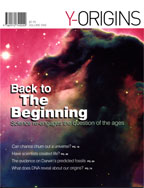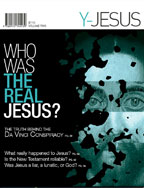TRYING TO AVOID THE BAD DREAM
A beginning to the universe was like a bad dream come true for materialists who wanted to believe everything had always existed. It brought scientists face to face with the logical conclusions that primary cause must exist. That argument is a simple logical syllogism:
1. Everything that has a beginning had a cause.
2. The universe had a beginning.
3. Therefore, the universe had a cause.
But admitting a cause leads to the next logical question: who or what is the cause?
Think about it for a minute. Since time, space, matter, and motion are all a part of the created universe, then before the beginning it was timeless, spaceless, and motionless.
What can happen spontaneously from this state of affairs? There’s nothing moving, there’s nothing colliding, there’s … well, nothing. Not even the potential for anything to happen.
The fact everything came from nothing has forced scientists to acknowledge that something outside of space and time, something very powerful and with apparent volition, must have acted to bring about the beginning. That is, there must have been an intelligent Designer of the universe. Some might go ahead and use the name God for this Creator.
Well, in certain academic circles, this line of reasoning simply won’t do. Thus it is that many materialists have looked for a way to prove that the universe didn’t have a beginning. Smoot remarks, “Cosmologists have long struggled to avoid this bad dream by seeking explanations of the universe that avoid the necessity of a beginning.”23
Sir Fred Hoyle (he who mockingly coined the term “big bang”) was one scientist who strongly opposed the concept of a beginning for the universe. In 1948 Hermann Bondi and Thomas Gold joined Hoyle in postulating that matter was in a continual state of creation. They called their idea the steady state theory, which was an attempt to show that the universe is eternal after all, even though the evidence had long been trending against such a view. However, the COBE discovery of background radiation was the fatal blow to the steady state theory. 24
Next came the oscillating-universe theory. According to this concept, the universe explodes, contracts, and explodes again, eternally yo-yoing. This would be another way to permit a belief in the eternal existence of the universe. But the physics for this theory didn’t work.
More recently, some scientists, including Hawking, have begun considering the so-called multiverse theory. This theory accepts that our universe is finite, but it suggests that ours is just one of many universes. The whole multi-universe may be eternal, according to this theory, even though our particular universe is not. This theory is covered in more depth in another article in this magazine, but the key point to understand about it right now is that it has no evidence whatsoever to support it.
These theories fit neatly with the philosophy of materialism, whereas a beginning of the universe would raise the obvious question, who was there to start it? Professor Dennis Sciama, Hawking’s supervisor while he was at Cambridge, admits his reasons for supporting the steady state theory: “I was a supporter of the steady state theory, not in the sense that I believed that it had to be true, but in that I found it so attractive I wanted it to be true.”25
An origin of the universe meant materialists were suddenly faced with the questions that threatened their worldview.
Back | Endnotes | Next
|




